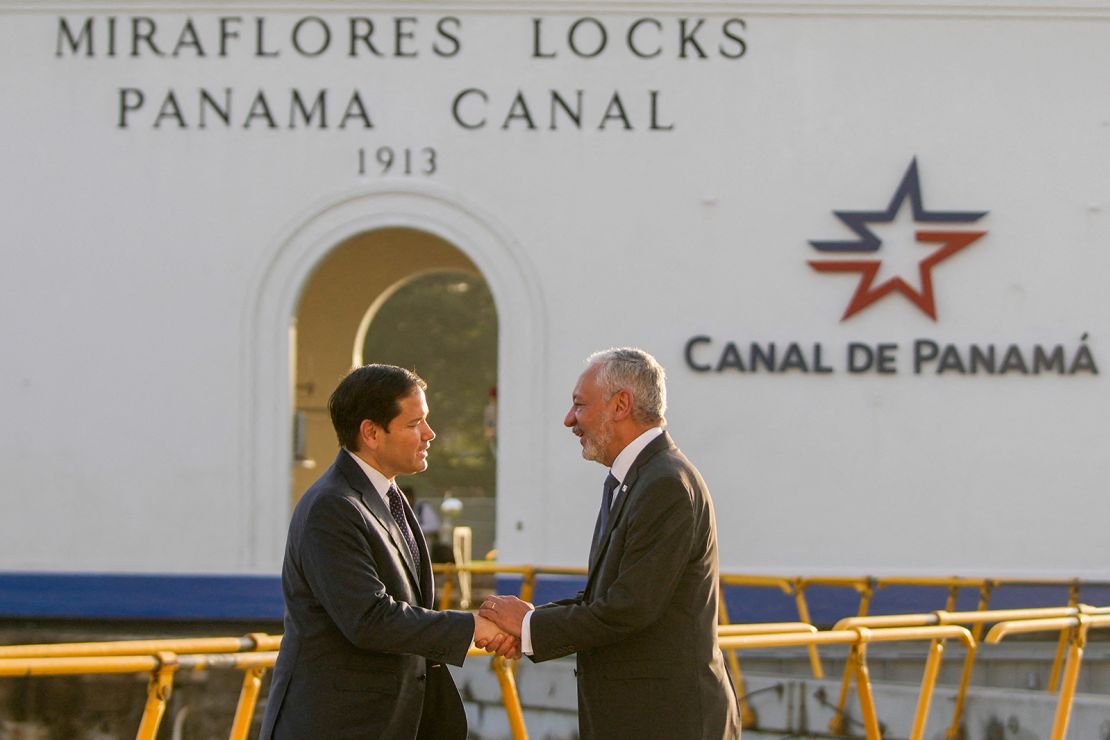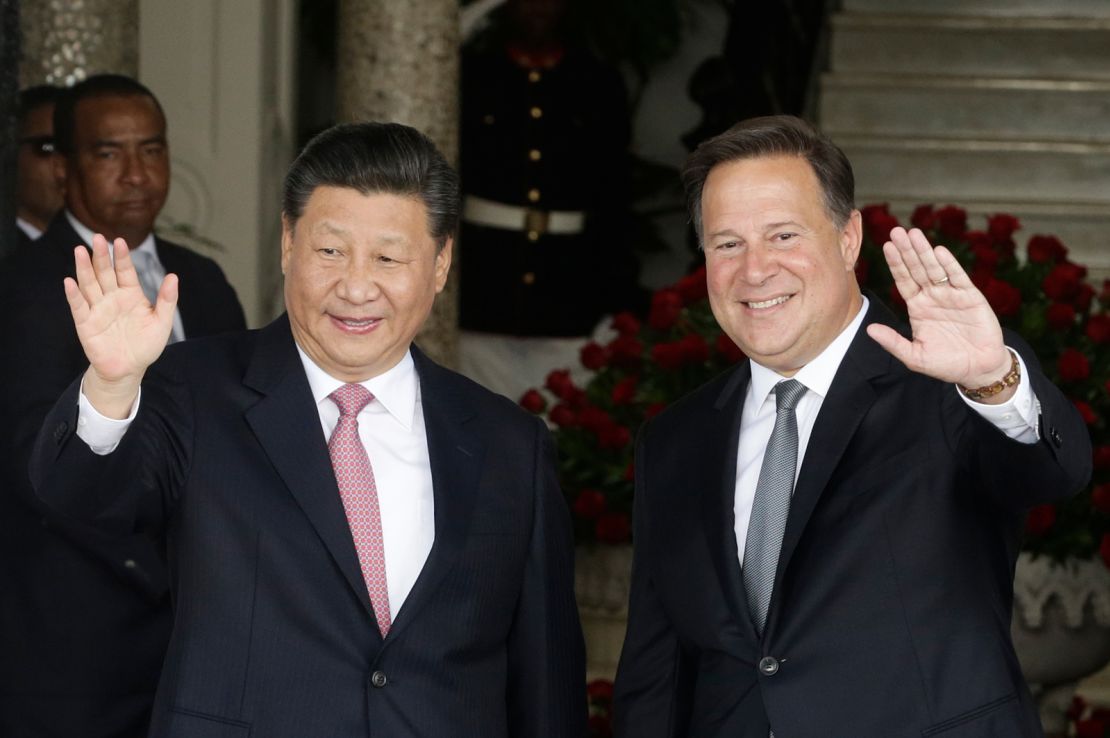Editor’s Note: Sign up for CNN’s Meanwhile in China newsletter which explores what you need to know about the country’s rise and how it impacts the world.
Hong Kong
CNN
—
Donald Trump has begun his second term as president by ramping up pressure on Panama – threatening to “take back” the Panama Canal and accusing the country of ceding control of the critical waterway to a US rival: China.
“Above all, China is operating the Panama Canal. And we didn’t give it to China. We gave it to Panama, and we’re taking it back,” Trump claimed in his inaugural speech last month.
There’s no evidence that China controls the canal, which is run by an independent authority appointed by Panama’s government. Beijing has repeatedly denied that it has interfered in canal operations.
But the US concern comes as the Trump White House seeks to shore up national security, especially in its own neighborhood, and win an economic competition with China.
At the heart of Trump’s contentions are a Hong Kong-based company that operates two key ports at either end of the 50-mile long waterway – and broader concerns about Beijing’s expanding influence in a region of the world where the US has long been the dominant power.
Panama’s President José Raúl Mulino has said Panama’s sovereignty over the canal was not up for debate, but the country has made other concessions to US pressure.
Following a meeting with top US diplomat Marco Rubio last Sunday, Mulino said Panama would exit China’s Belt and Road infrastructure drive – a blow for Beijing, which had celebrated Panama as the first country in Latin America to join the program.
Panamanian officials last month also launched an audit of the Hong Kong-owned firm that operates two ports at either end the canal.
Chinese companies have become increasingly caught in the crosshairs of Washington’s national security concerns. Chinese-owned app TikTok and telecoms giant Huawei have been among private firms facing intense scrutiny in Washington over concerns that they are ultimately beholden to Beijing, despite their denials.
Here’s what to know about China’s involvement in the strategic channel.

The Trump administration’s key concern is found at either end of the waterway, where two of the five ports that service the canal are operated by Panama Ports Company (PPC), part of a port operator owned by Hong Kong-based conglomerate CK Hutchison Holdings.
Based in a gleaming skyscraper in downtown Hong Kong, CK Hutchison is a publicly listed company and one of the world’s largest port operators, overseeing 53 ports in 24 countries, according to the company. It was first granted the concession over the two Panama Canal ports in 1997 when Panama and the US jointly administered the canal. That concession was renewed in 2021 for another 25 years.
Rubio ahead of his visit to Panama said Hong Kong-based companies “having control over the entry and exit points” of the canal is “completely unacceptable.”
Hong Kong, which Britain handed back to China 1997, is meant to have a high level of autonomy from the mainland, but Beijing has dramatically tightened its grip on the city in recent years following widespread pro-democracy protests.
“If there’s a conflict and China tells them, do everything you can to obstruct the canal so that the US can’t engage in trade and commerce, so that the US military and naval fleet cannot get to the Indo-Pacific fast enough, they would have to do it,” Rubio said in an interview with journalist Megyn Kelly, without directly naming the company.
The Hong Kong-owned operator PPC, however, does not control access to the Panama Canal.
Workers at their two ports load and unload containers onto ships and supply them with fuel, while the canal itself is operated by the Panama Canal Authority, CNN has previously reported. Ships transiting the canal are required to be piloted by local captains employed by the authority.
CNN has approached CK Hutchison for comment. In a recent statement on social media, PPC said it is the only canal port operator where the Panamanian state is a shareholder. More than 99% of its workforce was Panamanian, it added.
The Hutchison ports are not the only China-linked firms involved in canal infrastructure.
A consortium comprised of state-backed China Harbour Engineering Company and China Communications Construction Company was awarded the contract to build a $1.4 billion highway bridge over the canal to ease traffic in Panama City.
Meanwhile, state-owned COSCO Shipping is a major canal client, with nearly 300 of its cargo ships navigating the waterway each year, including container ships, dry bulk carriers, and oil tankers, according to company data from 2018.

There’s no evidence that the Chinese government controls the canal or of Chinese military activity in Panama, experts say.
But US officials’ concerns come amid a global scrutiny of Beijing’s efforts to build or secure access to commercial ports around the world – which could also benefit China’s expanding navy.
When it comes to the Panama Canal, some observers say that Chinese firms’ involvement in the canal and its infrastructure could give Beijing leverage – both in terms of commercial advantage and in the event of a potential future conflict with the US.
Rubio referenced this concern during a confirmation hearing for his post in January, saying that a “foreign power” possesses the ability, through their companies, “to turn the canal into a choke point in a moment of conflict.”
The strategic risk from a military perspective is that the more commercial assets that are linked to China around the canal, the more options Beijing has to block the US from moving military equipment through the waterway in the event of a conflict between them, according to R. Evan Ellis, a research professor of Latin American Studies at the U.S. Army War College Strategic Studies Institute.
“All of these operations, and the relationships with Panama Canal Authority … plus the technical knowledge that you get as a regular operator of the canal basically multiplies the possibilities that if you are (China) and you want to shut down the canal at a time of conflict, there are a thousand ways to do it,” he said, pointing to actions like attacking lock control systems or physically blocking the waterway. “Their physical presence, influence and technical knowledge … would make it harder for us to defend against.”
Federal Maritime Commission Chairman Louis Sola last week told Congress the US must also guard against “any effort by other interests in Panama to diminish the independence or professionalism of the (Panama Canal) Authority.”
A 1977 treaty laying out the return of the canal from the US to Panama requires the canal to remain neutral and allows for the US to intervene militarily if the waterway’s operations are disrupted by internal conflict or a foreign power.
However, some observers see little or limited sway from China at present.
The US is so firmly established as a the “pre-eminent” partner for Panama that any leverage over goods passing through the canal that China could hope for by enhancing its ties in the country is “capped and limited at best,” according to Brian Wong, a fellow at the University of Hong Kong’s Centre on Contemporary China and the World.
And Vincent Clerc, CEO of global shipping giant Maersk, told CNN’s Anna Stewart on Thursday that operations in the canal “had been more impacted by lack of rainfalls … than it has been impacted by the Chinese.”

A 2018 state visit from Chinese leader Xi Jinping to the country of roughly 5 million underscored just how much emphasis Beijing – a major global exporter – has placed on building its ties with the strategically vital country.
Then, the countries inked some 19 agreements to collaborate on trade, infrastructure, banking, and tourism, while Xi declared their relations had “turned over a new chapter.”
That certainly was the case then. China and Panama only established diplomatic ties a year prior, after Panama stopped recognizing Taiwan as the government of China. That same year Panama became the first country in Latin America to join Xi’s flagship Belt and Road global infrastructure development initiative.
Those changes were accompanied by a flurry of bids from Chinese companies to build and invest – projects ranging from a $1 billion container terminal to a high-speed rail. Both those projects ultimately fizzled, as a change in Panama’s leadership brought greater scrutiny over such plans and US concerns drove more caution.
But Chinese firms have also had successes.
A China-built cruise ship terminal was inaugurated last year, while Chinese companies also have a significant presence in special trade zones near Colon and Panama Pacifico, experts say. Chinese telecommunications giant Huawei in 2015 opened a large distribution facility for its electronic systems from one of those zones.
Mulino’s decision not to stay involved in the Belt and Road initiative may signal a new stage of scrutiny on China’s presence in the country.
China’s Foreign Ministry on Friday criticized the US for using “pressure and coercion” to “discredit and undermine” Belt and Road cooperation. A spokesperson said Beijing hoped Panama would “eliminate external interference” and “make the right decision.”
Observers say Beijing is likely to remain ready to engage with Panama when possible.
“China will continue to make investment in Panama if the Central American nation needs the money, and China will continue to trade with Panama,” said Jiang Shixue, director of the Center for Latin American Studies at Shanghai University. Panama’s decision will merely signal to Beijing that “American pressure is so huge,” he added.
Meanwhile, there are signs that while China has an interest in expanding its footprint in the country, it may have other goals, in places with less potential resistance.
“Control of strategic chokepoints like the Panama Canal is probably among China’s goals,” said Will Freeman, Fellow for Latin America studies at the Council on Foreign Relations in New York.
“But it’s dwarfed in importance by a project like Chancay, the new Peruvian mega-port which will accelerate South America-China trade.”

















